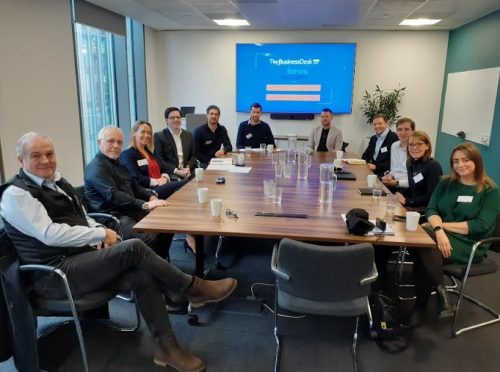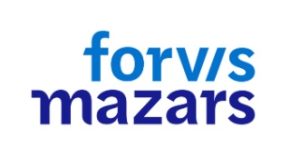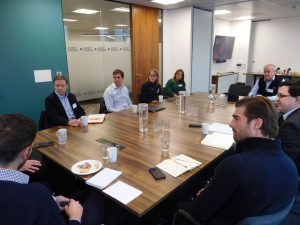Roundtable: Succession and Exit Planning – risks and opportunities

What are some of the potential pitfalls or prospects for expansion which business owners need to consider when the time comes for them to pass the torch to a successor?
A panel at TheBusinessDesk.com’s roundtable on Succession and Exit Planning examined how businesses can make the complex process as smooth and pain free as possible. The discussion also explored the option of setting up an Employee Owned Trust. (EOT)
The roundtable was chaired by TheBusinessDesk.com’s joint managing director Alex Turner and sponsored and hosted by Forvis Mazars.
Dan Platt, CEO at Ultimate (Commercial Interiors) Ltd, commenting on his own experience of taking over from two former business partners, said it had proved positive for his firm, unearthing untapped potential and new opportunities for improvement.
“Since the buyout, I’ve undertaken a substantial restructuring, transforming the business over the last 18 months to position us for even greater success,” he said.
“With the buyout, I brought in five long-standing directors to form the new Senior Leadership Team, all of whom are now owner/directors.
“On reflection our 22-year success story has been due to the volume of repeat business and recommendation, which while fantastic has meant we’ve been very reactive.
“Our strategy had been underdeveloped, and now we’re taking a much more deliberate and strategic approach to drive sustainable growth.”
Alex Baskeyfield, partner – mergers and acquisitions at Forvis Mazars, warned exiting a business is complicated. He said departing company owners should take advice and be careful about who they communicate their intentions to, because competitors will seek to take advantage.
Commenting on the EOT avenue, he said: “An EOT is tax free, quite easy to arrange and for some businesses has been the right answer.
“We’ve advised on EOTs that have worked really well. But more often when you get into the detail, an EOT is not the answer. It can’t just be a short-term fix for succession.
“For lots of businesses EOTs are a fantastic home if they are used in the way they are designed to be: a long-term home for the business, to create a structure that is for the benefit of all the employees.”
Natalie Wright, managing partner Leeds, head of family business at Forvis Mazars, said she had helped about 150 families through the succession process over the last 10 years.
She added: “That succession has taken various guises, from preparing the next generation, looking at buyouts or EOTs.
“An EOT can work really well if it works for the culture of the business. But if you’re doing it purely as a tax free transaction, the tax will get you later on.”
Samantha Ambler, chief people officer at First Event, which became an EOT back in 2021, said switching to this model had felt like a natural evolution for the firm.
She said: “The reasons we moved to an EOT were the right ones. There’s lot of people looking at it for tax purposes and that wasn’t our reason.
“It was due to [our founder and MD] Richard [Murphy] wanting to reward the loyalty of people who had been loyal to him.
“And it means our employee council is a strong force for good in the business. They are really actively involved. They ask the questions that need asking.”
She said employees felt deep loyalty to the business, despite it having grown rapidly from being a £2m turnover company to a £30m turnover enterprise.
Picking up on this issue of company loyalty and inclusivity, Charles Draper, CEO, of Sure Group, highlighted how important it is for firms to build loyalty for the long-term.
Commenting on his own company, he said: “We’ve allocated people to leadership roles, they’ve got shares of equity in the business.
“Now more than ever if you want to get proper buy in from good, hardworking solid people you can rely on, you have to look at where the country is. There’s people moving jobs all the time.
“It’s not like it was 20 or 30 years ago when people stayed in jobs for 10, 15 or 20 years.”
Paul Mitchell, chairman of The Harris Partnership, outlined how he has tried to ensure his business has an inclusive management structure. He said he made sure no one had a majority share in the business.
He explained: “If someone’s got 51% everybody else has to toe the line and it’s not an inclusive management arrangement.”
But Andy Bairstow, chairman of PFF Packaging Group, commented: “I’ve done shares twice and got my fingers burned each time because those individuals wanted to leave and it gets really messy because their vision of what their 5% shareholding is worth compared to what it’s actually worth are two different things.
“Each time it has cost me a fortune to deal with.”
Panellists returned to debating whether family succession is always the best option when there may be non-family members of the business better qualified to take the helm.
Ellie Jobes, HR director at Bagnalls, said: “At our business we say that anyone from the family interested in working at Bagnalls needs to work somewhere else first.
“And you must not forget about people who aren’t part of the family. They may be the best people to run the business eventually.”
Adam Johnson, director at Tudor International Freight, said he hadn’t always assumed he would step into a senior role at his father’s company.
“My dad still works at the business and he’s 40-years-older than me,” he said. “I had no real intention of joining the business at all – my dad never approached me. It was only when I was working as an accountant that I decided to have a bit more of a chat with my dad about it.
“The staff there are my dad’s staff, not my staff. When you first join you feel you have a bit of imposter syndrome. But it does make you work that little bit harder.”










